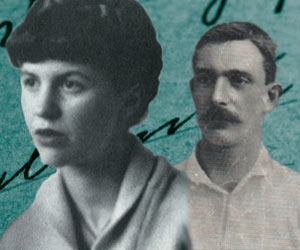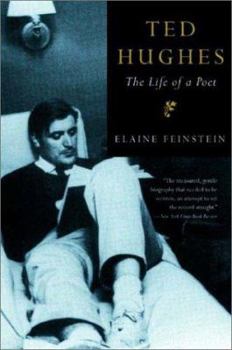Ted Hughes: The Life of a Poet
Select Format
Select Condition 
Book Overview
Although Ted Hughes ended his days as England's beloved poet laureate, his life was dogged by tragedy and controversy. He never entirely recovered from the suicide of his wife Sylvia Plath in 1963,... This description may be from another edition of this product.
Format:Paperback
Language:English
ISBN:0393323625
ISBN13:9780393323627
Release Date:February 2003
Publisher:W. W. Norton & Company
Length:300 Pages
Weight:0.70 lbs.
Dimensions:0.7" x 5.5" x 8.2"
Customer Reviews
5 ratings
Briliant!
Published by Thriftbooks.com User , 15 years ago
Elaine Feinstein, British poet and writer, herself an acquantaince of Hughes, succeeded in writing a fine and clear account of Hughes' prolific career as a poet. This book is very non-biased, well researched, and expertly written. Feinstein taps into Hughes' unique and artistic interpretation of the world, and shows how is poetry reflects that. Feinstein writes that Hughes himself "was not writing to stun or to startle, but to understand," and Feinstein achieves as well a clear understanding of Hughes in his own right, not as the murderous mysogynist some may believe him to be. She focuses on Hughes' interest in mysticism, folk talkes, the occult, British as well as world literature, and his strong sense of individualism. Brilliant book, I'd reccomend it strongly to any interested in Hughes, Plath, or poetry.
Survivorship
Published by Thriftbooks.com User , 16 years ago
Hughes as a callow husband is a caricature. He was born in Yorkshire in 1930. His father had served in the Lancashire Fusiliers in the First World War. World War II gave Ted Hughes the opportunity to learn to cope with material scarcity. The 1944 Education Act enabled any brilliant student to pursue admission to Oxbridge. He attended Mexborough Grammar School. In 1948 he won an Open Competition to Pembroke College, Cambridge. His personal canon of poets by then included Rilke, Yeats, Blake, Coleridge, Wordsworth, Keats, and Hopkins. After national service, he entered Pembroke in 1951 to read English. Hughes felt that for reason of social rancour, the university was a destructive experience for him. He had natural reserve and natural good manners and made an impression on contemporaries. He found it hard to write poetry as an undergraduate, but his dedication to becoming a poet did not lessen. Ted was fascinated by the theories of Robert Graves. Ted Hughes married Sylvia Plath when she was at Cambridge on a Fulbright Scholarship. In some respects the couple wanted to live like D.H. Lawrence and Frieda. Sylvia, though, was not really suited to a vagabond life. She sought a secure existence in financial terms. Fortunately Ted looked forward to meeting American poets at Smith College where Sylvia was to be an instructor. He found it difficult to function in America. Leaving Horthampton for a freelance writing life in Boston pleased Ted but made Sylvia anxious. In 1959 the couple was determined to return to England. Ted, among other things, feared American conformity. In April 1959 Ted was awarded a Guggenheim Fellowship. He wrote material for the BBC. Much of Ted's spirit was sacrificed to placate Sylvia. By this time Frieda had been born. The family moved to Court Green in Devon in 1961. At that time THE BELL JAR was completed. Ted became convinced, in retrospect, that it had been an error to move to Devon. Nicholas was born in 1962. Ted and Sylvia separated after Ted developed a friendship with Assia Wevill. Nevertheless, they went as a couple to Ireland, and made plans to go to Spain. Sylvia was writing. In her intense love of syllables she resembled Ezra Pound. Sylvia sought a divorce, not Ted. By December 1962 she had moved back to London. Ted gave her money and lived on funds borrowed from his aunt. In the final week of her life Sylvia confessed to Ted that a divorce was the last thing she wanted. Assia felt her own life was linked to Ted's through Sylvia's death. Ted was determined to publish Sylvia's last poems. He considered them stunning. Olwyn, Ted's sister, was to help with the children. Ted became an advocate for other poets. He supported poetry in translation. Poetry was seen as a spiritual strength. Sylvia Plath's worldwide fame was posthumous. Ted lost his mother, Assia, and their daughter Shura around the same time. In 1970 he married Carol Orchard. Hughes released his copyright
A fine example of the art of biography
Published by Thriftbooks.com User , 20 years ago
TED HUGHES: THE LIFE OF A POET by Elaine Feinstein was a fabulously engaging read about the "other half" of the famous Sylvia Plath-Suicide Poet story. Hughes, born in Yorkshire, read English, Anthropology and Archeology at Cambridge, and met Plath, the ambitious American while she was on a Fulbright to Cambridge, after he had graduated. Their meeting was violent and dramatic (she bit him on the cheek when they kissed at a party he had brought another date to), and they quickly married. They had two children, and after she discovered his affair with another woman, they separated. During a harsh London winter, Plath killed herself by putting her head in an oven and leaving on the gas, and Hughes suffered the weight of that death for pretty much the rest of his life. That's the short story. The long version, as told in Feinstein's book is fair, multilayered, well and accessibly written, and includes informative critical comments of his work, and follows the path of his career. After Plath's death, Hughes maintained a relationship with the object of his affair, Assia Wevill, and other women. She had a daughter with him, and suffering her own depression, she killed herself AND their daughter within 10 years of Sylvia's death. Hughes was marked by some feminists as a horror of a husband, which was based on Sylvia's own viewpoint in her poems (poems that Hughes published, even though he was horrified at Sylvia's use of personal incidents for public poetry). Later, Hughes married a woman named Carol Orchard, and they were married for nearly 30 years. He also seems to have had numerous affairs in his life, and yet found Carol to be a stabilizing influence. Feinstein's work is important because she gives us a fuller picture of Britain's Poet Laureate Hughes (a work she began after his death in 1998 from cancer). Hughes, in an effort to protect his children with Plath, Freida and Nicholas, liked to maintain privacy about his life with Plath (and also, one suspects, because he just WAS private). When his book of poems about Plath was published in the years before his death, BIRTHDAY LETTERS, positive feeling was overwhelming for him, as people read the beautiful poems that spelled out his love, fear, hurt, empathy and his sense of powerlessness in the face of Plath's need in his relationship with her. This is a book you may read with other books around. I got out Plath's COLLECTED POEMS and Hughes's LUPERCAL and BIRTHDAY LETTERS to refer to. I recommend this biography to anyone. The dramatic events of his life make this compelling to those who have never read a word of his poems, and it stands as well, as fine example of the art of biography alone. Feinstein, who knew Hughes socially after the death of Plath, is sympathetic to him, but fair, I felt. As the quote on the book states, this is a book that needed to be written. It was written well.
Finally puts the travesty of "Bitter Fame" to rest..
Published by Thriftbooks.com User , 21 years ago
This biography is wonderfully written and compulsively readable. But most importantly, it finally sheds light on the full, real, complex people that Ted Hughes and Sylvia Plath were. It also dispells and negates much of the awful Anne Stevenson/Olywn Hughes biography, "Bitter Fame". This book captures the man that captured Plath. It's a much for all fans of both.
Was he to blame?
Published by Thriftbooks.com User , 21 years ago
First of all it deserves 5 stars because it's magnificient entertainment and well written. For some reason the lives of poets make much easier reading than does their work. I have to confess that on my shelves sit well-thumbed biographies of Dylan Thomas, Anne Saxton, George Barker (Fraser's "Chameleon Poet") Coleridge, Shelley and Byron, but not a single volume of their work (except "The Bell-Jar" and "Rhyme of the Ancient Mariner.") Ted Hughes was married to Sylvia Plath. She killed herself, possibly because of his affair with Assia Weevill. Assia had his child, Sura, then killed herself and the four-year-old Sura. Of course he is not to blame for these suicides, but was his conduct good? I am struck in this biography. which is written from a pro-Hughes standpoint, by his behavior towards the children. After their mother's death the nine year old and eleven year old were packed off to boarding schools so that their father could have "more time to think and work." Feinstein does not comment (and perhaps comment is superfluous) on the poignant irony of his Jewish child being gassed ( I only hope and pray that she died before her mother did). Feinstein throws in a suggestion that Sura was brain-damaged but gives no more details. This is all the more relevant because his often-stated reason for withholding material from bioraphers was to protect his children. If he had nothing to hide then why withhold? From this account it seems that Hughes became rich and famous mostly because of having been married to Sylvia Plath. He might have been a notable poet, which might have made him famous, but even the most notable poet barely makes a living. His poems that were best-sellers were "The Birthday Letters." He was Plath's legal heir and received the royalties fron "The Bell Jar." Feinstein seems to have had access to some of the medical records on Assia ans Sylvia. Both took anti-depressant medications;it would have been relevant to tell us more about these. Both women died by gas poisoning. Did British household gas supplies still contain carbon monoxide at that time? These are details a biographer should have researched. My next reading stop will be Alvarez's "Jealous God."
Ted Hughes: The Life of a Poet Mentions in Our Blog

Sylvia and Ted: Their Troubled Romance
Published by Ashly Moore Sheldon • February 26, 2021
Sixty-five years ago today, Sylvia Plath and Ted Hughes met at a party in Cambridge. Their connection was immediate, powerful, and violent—a portent of their future together. Almost exactly seven years later Plath would die by suicide.




